 MyDogBreeds
MyDogBreeds Chart Polski is originated from Poland but Siberian Husky is originated from Russia. Chart Polski may grow 20 cm / 8 inches higher than Siberian Husky. Both Chart Polski and Siberian Husky are having almost same weight. Both Chart Polski and Siberian Husky has almost same life span. Both Chart Polski and Siberian Husky has same litter size. Chart Polski requires Low maintenance. But Siberian Husky requires Moderate maintenance
Chart Polski is originated from Poland but Siberian Husky is originated from Russia. Chart Polski may grow 20 cm / 8 inches higher than Siberian Husky. Both Chart Polski and Siberian Husky are having almost same weight. Both Chart Polski and Siberian Husky has almost same life span. Both Chart Polski and Siberian Husky has same litter size. Chart Polski requires Low maintenance. But Siberian Husky requires Moderate maintenance
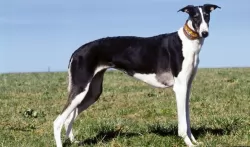 The Chart Polski dog is a member of the Greyhound family and comes from Poland. He is an old dog breed dating way back to the 1600s.
The Chart Polski dog is a member of the Greyhound family and comes from Poland. He is an old dog breed dating way back to the 1600s.
The dog also goes by other names such as the Polish Sighthound and the Polish Greyhound. The dog looks quite similar to the English Greyhound and has been used as a hunting dog. With his exceptional speed, he has been able to run down prey.
The Chart Polski has always been seen in privileged classes, and after dying out to some extent, it became popular again in the 1970s. It is looked upon as a companion dog essentially while also still being used for hunting in Poland.
Today, the Polish Kennel Club as well as the Federation Cynologique Internationale, and the United Kennel Club recognize the breed.
 Siberian Huskies are very close to Chukchi people.Chukchi is a tribe in Siberian nomads and huskies are beleived to be originated with them. DNA tests on huskies prove that they are the oldest among the dog breeds and they used them to travel fast. Also children used to sleep with them as they provide body heat to them. Siberian Huskies also like to be very close to the children. In 1908 at the gold rush, huskies were imported to Alaska and used as sled dogs. In Alaska they were used for dog sled race until today.
Siberian Huskies are very close to Chukchi people.Chukchi is a tribe in Siberian nomads and huskies are beleived to be originated with them. DNA tests on huskies prove that they are the oldest among the dog breeds and they used them to travel fast. Also children used to sleep with them as they provide body heat to them. Siberian Huskies also like to be very close to the children. In 1908 at the gold rush, huskies were imported to Alaska and used as sled dogs. In Alaska they were used for dog sled race until today.
Siberian Huskies were exported from Siberia and they continued their journey in North America. American kennel club recognized them in 1930 and the Siberian club of america has been founded in 1938.
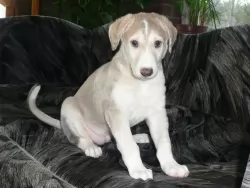 The Chart Polski looks similar to other sighthound breeds, and is a large breed, standing at between 68-80cm and weighing between 26 and 32kg. He is well muscled, slender and lean.
The Chart Polski looks similar to other sighthound breeds, and is a large breed, standing at between 68-80cm and weighing between 26 and 32kg. He is well muscled, slender and lean.
The face is typically long and narrow, although the muzzle is somewhat blunter than most sighthounds. His coat is short and sleek and can be in colors such as white, tan, black or a combination of these. His eyes are large and dark brown, the ears medium sized and narrow and usually folded back while the tail is long and curved at the tip.
The Chart Polski’s temperament is somewhat different to most sighthounds and he is thought to be more gentler and evenly tempered. He is loving and affectionate and will form a close bone with his human family.
He is confident, stubborn and strong-willed, and because he has been used for hunting, he has also got some aggressive tendencies towards other animals. He will need training and socialization to ensure he is good around other pets in the home as well as with children.
He becomes obedient and responsive with this training and socialization. He is a territorial breed, being protective around what he considers his own property and will make a good watchdog.
 Siberian Huskies are said to be one of the beautiful dog breeds in the world. They are well known for their thick coat and blue coloured eyes. Siberian Huskies are really challenging for new dog owners. It is preferred to give them a fenced yard and the fence should be sunk well to the ground to prevent them from escaping, as they always try to escape. They are medium sized working dogs having high energy level. Initially huskies were developed as sled dogs.
Siberian Huskies are said to be one of the beautiful dog breeds in the world. They are well known for their thick coat and blue coloured eyes. Siberian Huskies are really challenging for new dog owners. It is preferred to give them a fenced yard and the fence should be sunk well to the ground to prevent them from escaping, as they always try to escape. They are medium sized working dogs having high energy level. Initially huskies were developed as sled dogs.
They are affectionate and intelligent breed. Also they are independent in nature. They are kid friendly dogs and also are friendly with everyone including strangers. Siberian Huskies will be a good companion when given proper training and care. They are low shedders but it depends on the climate it lives. Normally they dont shed in cold climate but in warmer climate they will do. They shed heavily twice in a year for a three week strech. Normally Siberian Huskies do not suit well for apartment living. They are not watchdogs as they will bark very rarely but it enjoys to howl.
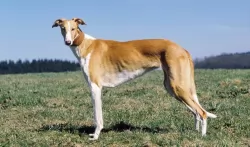 Your Chart Polski or Polish Greyhound promises to be a loving, devoted pet that fits in well to a family that will give him good exercise and look after him well.
Your Chart Polski or Polish Greyhound promises to be a loving, devoted pet that fits in well to a family that will give him good exercise and look after him well.
He isn’t as gentle as other hounds and can therefore make a good watchdog too. He is territorial and wants to protect all those he regards as his own.
Train him and socialize him, and you will see that this intelligent, independent and self-confident dog can become obedient and also relaxed around people as well as other pets in the home, making him a splendid pet for those who admire these tall, slender dogs.
 Siberian Huskies are very much affectionate with children. But it is necessary to train both parties to behave with each other. It is recommended to have an adult supervision for younger children.
Siberian Huskies are very much affectionate with children. But it is necessary to train both parties to behave with each other. It is recommended to have an adult supervision for younger children.
They are very good diggers and so they should be watched if they are in garden. They tolerate well in cold weather and mostly huskies can be seen in the area of snow falling. They are very good in pulling sledges.
They adapt well in cold weather. It is advised to give them a well fenced yard. They do not like apartment living. Also they do not like to be alone and if kept alone for long time they will disturb your house and make it dirty.
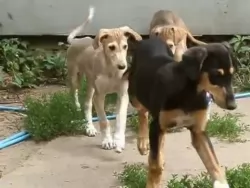 The Chart Polski can live to be 10 – 12 years when he gets his full quota of care in terms of good diet, exercise, love and care and a nice dry, warm place to sleep.
The Chart Polski can live to be 10 – 12 years when he gets his full quota of care in terms of good diet, exercise, love and care and a nice dry, warm place to sleep.
He isn’t known to have any specific health issues that could shorten his life, but by knowing about some of the common dog ailments there are, you can watch your pet and even prevent some risks.
People often think that bad teeth can’t do much harm, but tartar build-up can progress to gum disease, to the roots of the teeth and to damaging other parts of the body such as kidney-, liver- and heart.
Bacterial and viral infections are a threat to any dog, and rabies and parvo for instance can take your pet’s life. Remember that terrible diseases such as these can be prevented through having your dog vaccinated.
Dogs are open to getting all kinds of parasites inside- as well as outside on the skin. Hookworm, roundworm, fleas and ticks are examples of these parasites that can get into your pet’s system through dirty food,water and bites from mosquitoes. Some of these parasites can even be transmitted to you.
If your pet is in any way run down, get him to a vet immediately as there is an effective treatment.
 Siberian husky suffers with minor health problems such as hypothyroidism, Progressive retinal atrophy and cataract. They are also prone to lose pigment in nose and muzzle. Some health problems occur due to bad breeding practices and some due to environmental problems where the puppy is brought up. They have also chances to get skin disease such as allergies.
Siberian husky suffers with minor health problems such as hypothyroidism, Progressive retinal atrophy and cataract. They are also prone to lose pigment in nose and muzzle. Some health problems occur due to bad breeding practices and some due to environmental problems where the puppy is brought up. They have also chances to get skin disease such as allergies.
When they are in the age of 2 to 5 years, they are having chances to hairloss due to Alopecia X. This condition mainly causes due to hair clipping in Siberians. They will be healthy but the hair will not grow in affected areas. Siberians are double coated and when the situation prevails the topcoat will fall off first and the undercoat follows it. The hair will fall off in both side of the dog in same area. Spaying or neutering will reduce such problems as it causes because of sex hormones.
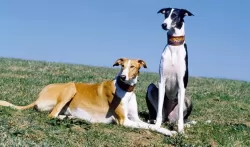 The Chart Polski was bred as a hunting dog and to run at top speed to bring down its prey. Today, he is tall and lean and still loves to run, and will therefore require a good deal of exercise.
The Chart Polski was bred as a hunting dog and to run at top speed to bring down its prey. Today, he is tall and lean and still loves to run, and will therefore require a good deal of exercise.
Don’t let his slender build deceive you because he is powerful and will need a walk every day and be given the opportunity to run. He will happily accompany you when you go running or cycling. Left un-exercised, he will become frustrated and aggressive and even destructive, so as a responsible dog owner, it is up to you to ensure he is well exercised.
The Chart Polski is a large breed puppy and they tend to grow fast at first. You want to make sure that he doesn’t put on weight too quickly as this puts them at risk for skeletal development problems later on such as hip- and elbow dysplasia. Speak to your veterinarian about feeding your puppy correctly so that he grows slowly, allowing his bones and joints to develop strongly and healthily.
Your adult Chart Polski will also need a special diet that caters for his size and energy levels. Remember to include some raw meat into his diet occasionally as well, as this will help him steer clear of dry, allergic skin conditions. Always ensure that he has access to fresh, cool water.
As a hunting dog, you’ll find the Chart Polski to require little grooming. No trimming or stripping is required for his short coat and you’ll simply need to brush him down twice a week.
 In one method of feeding the Husky puppies, the food will be given always available, but this method is not recommended as it has some problems. This method is followed by large breeders because of lack of time to spend on individuals. Another method is to keep meal for 3 times a day. At about 12 to 16 weeks of age the meals can be reduced to two times a day. In this method the meal given should not be there after 15 minutes even if puppy did not ate. The important training for Husky puppies while eating is they should not growl when the food is taken by its master.
In one method of feeding the Husky puppies, the food will be given always available, but this method is not recommended as it has some problems. This method is followed by large breeders because of lack of time to spend on individuals. Another method is to keep meal for 3 times a day. At about 12 to 16 weeks of age the meals can be reduced to two times a day. In this method the meal given should not be there after 15 minutes even if puppy did not ate. The important training for Husky puppies while eating is they should not growl when the food is taken by its master.
Many Siberian experts don't like commercial dog food as they are sure that because of such foods dog may get problems like itching, dandruff, loose stools and hot spots. According to experts the good food for them are home cooked food from turkey, real chicken, beef and fish. Fruits and fresh vegetables are also very good for them. It is advised by dog owners to add only low salt or even without salt in their food. Also sugar is not good for them as it will bring some problems like hairfall and itching.
Siberian huskies can be easily groomed. Their eyes should be checked in puppyhood as they get chances to get eye problems and hereditary eye diseases. It is advised to make siberians to bath once in a year and they must be brushed once in a week. While brushing, the ears should be inspected and its teeth should be brushed. It is good to trim the long hairs in their feet and also nails should be trimmed slightly and very carefully as they have blood vessels there.
To give training and exercises to Siberian Huskies, the home should be prepared for them and it is better to make a fenced yard to prevent escapes. They have very high chances to escape and so the fence should be minimum 6 feet high and base should be strong as it should not break it or dig under to escape. Since they are active from their puppyhood they must be given lots of exercise. They should be socialized in their early stages as to get good behaviour and manners.